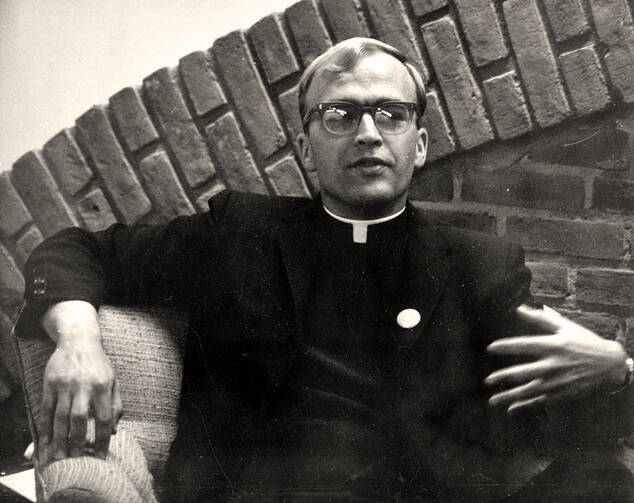Father William Dubay was one of the most famous and controversial young American priests of the 1960s. In his pastoral apostolate he was best known for his efforts to break down racial segregation in the Archdiocese of Los Angeles and for his proposal that the priesthood be unionized. His most dramatic move came in 1964, when he publicly called upon Pope Paul VI to remove Cardinal James Francis McIntyre for his failure to support desegregation. Father Dubay was reassigned, censored and eventually suspended from the priesthood. Although the editors of America did not agree with some of his ideas, they did defend his right to a fair trial. By 1968, he had left the priesthood and married Mary Ellen Wall of Seattle.
In 1969, he told a reporter that he had not been to Mass in some time and perhaps should be called an atheist. I had met Father Dubay in California three years prior and wrote about our encounter in America. Earlier this year, when his new memoir came across my desk, I wrote about him again on our website. He replied to my article, saying that his concept of God had developed, so we invited him to tell us how. — Raymond A. Schroth, S.J.
My faith has remained pretty much the same since I left the priesthood in the 1960s.
As I wrote in my book, “God has become rather earthy.” I had been reading Alan Watts and was impressed with the teaching that God is the “soul of the world,” making nature the face of God.
The universe is God’s workplace, and creation is an ongoing project. As intelligent beings, our job is to pay close attention to every phase of the living universe.
We are also asked to join him in making the world a better place for all his creatures.
The aboriginal peoples of Australia seem to be very good at this. They developed an intimate knowledge of every plant, animal and water source on the continent.
Instead of domesticating animals, they domesticated their environment. They worked to optimize the health and wellbeing of every species. They adopted a life of extreme simplicity, rejecting not only technology and agriculture but even clothes.
By the time the British arrived in Australia, the whole continent was a well-managed garden. This attention to nature guaranteed the survival of their own species, no matter how drastically the climate changed. They saw this work of tending nature as sacred and the means of achieving their destiny.
They passed on their great volume of knowledge through their “song lines” and their art, ritual and literature. Teaching was central to their lives and ours.
Our duty is also to teach. The voice we hear in our head is not talking to itself. It is telling others something. We are all born communicators. What Chaucer wrote about the monk is true of us all: “And gladly wolde he lerne and gladly teche.”
As Christians, we have a special mandate to reduce the suffering and poverty in the world. This means opposing war and capital punishment. Much, if not most, suffering is man-made.
For that reason, I have always felt the obligation to follow human events and get involved in politics. As Father O’Malley told us in moral theology class, “It’s all in the newspapers.”
As to the afterlife, I believe with Aristotle that the soul after death is “not going anywhere without a body.” Besides, life without a body doesn’t appeal to me much at all.
I am more than happy to have been given one body and one life on this earth.
And what a trip it has been!








